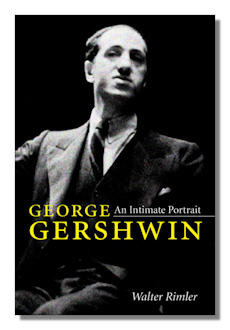
The Internet's Premier Classical Music Source
Related Links
-
Introduction
Acoustics
Ballet
Biographies
Chamber Music
Composers & Composition
Conducting
Criticism & Commentary
Discographies & CD Guides
Fiction
History
Humor
Illustrations & Photos
Instrumental
Lieder
Music Appreciation
Music Education
Music Industry
Music and the Mind
Opera
Orchestration
Reference Works
Scores
Thematic Indices
Theory & Analysis
Vocal Technique
Search Amazon
Recommended Links
Site News
 Book Review
Book Review
George Gershwin

An Intimate Portrait
Walter Rimler
University of Illinois Press
ISBN-10: 0252034449
ISBN-13: 978-0252034442
Summary for the Busy Executive: A place to start.
Things are looking up in Gershwin scholarship. For years, of course, both jazz and classical tastemakers patronized him as a musical naïf – in the typical view of Virgil Thomson, a man who knew little about the craft of composition, but whose "heart was pure." Charles Schwartz, in his George Gershwin: His Life and Music, dumps all over Gershwin's work (although he generously excepts Rhapsody in Blue) and treats the composer's admirers as philistines and dupes. However, the winds have begun to change.
The most interesting thing to me about Rimler's book is his informed admiration for Gershwin the concert composer. There happen to be valid bases for Gershwin's incredible success. Rimler seems to have actually looked at scores. Frankly, I've known Gershwin's worth for fifty years. First, I fell for what I heard and then looked carefully at scores to analyze what was actually going on. I also had the good luck to run into a maverick composition teacher who helped me look under the hood of many of Gershwin's songs. Nice to know the critical fraternity and academia have begun to catch up. Gershwin knew a lot about music from his earliest days. He even became interested in Schoenberg, way before Schoenberg was generally known in American professional music circles. In the Twenties, he became an avid fan of Alban Berg. He always pushed to learn more. Even after his successes, he kept looking for composition teachers and made time to work through exercises and to go beyond the limits of the 32-bar song.
Rimler has somewhat mis-titled his book. It's not really all that "intimate," although it does open up new territory about Gershwin's love of Kay Swift and details his last, miserable days. Ira's wife, Leonore, emerges as an Iago or at least as insanely jealous of George and any woman he got serious about. She effected a rift between the brothers: Ira too diffident to protest and George too sick and weak. Eventually, she ordered him out of the house they shared and made sure he died alone, in effect lying to Kay Swift about the seriousness of George's condition. We also find out about Gershwin's efforts on behalf of European Jewry during the Thirties and against anti-Semitism at home (he was refused a room in Toronto because he was a Jew; hatred trumps celebrity). The other stuff has been out there for years, although Rimler does a splendid job creating a fast-moving narrative.
The book runs a little short, but it's not meant to be exhaustive. Even so, it manages to advocate for Gershwin's concert work, with a few technical details that an intelligent general reader nevertheless can follow. It also acutely sums up the critical cleft stick in which Gershwin found himself. After slamming Gershwin's works for having great tunes and little else, critics slammed him for lacking tunes in his more formally tight later pieces, like the Second Rhapsody and Cuban Overture. Porgy and Bess, his final large masterpiece (there were magnificent songs yet to come), has only recently emerged from a fog of musical and social incomprehension, aided by several recordings of the absolutely complete version, which made it clear that he knew exactly what he was doing and what his achievement had been. And, let's face it, no other American opera has either come close to gaining an international foothold in opera houses, even with the difficulties of finding an all-black cast, or penetrated so deeply into Western culture. Rimler also appreciates how Gershwin deliberately used his later Broadway shows (mostly flops, but usually with great songs) to prepare himself to write the opera.
This book should appeal to Gershwin aficionados as well as to novices. It gives a clear arc to Gershwin's life as well as opens up new avenues of inquiry.
Copyright © 2013 by Steve Schwartz.



















